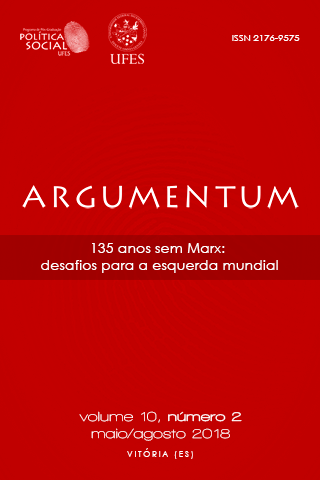Marx e a crítica às ilusões democráticas: escritos pós-1850
DOI:
https://doi.org/10.18315/argumentum.v10i2.19542Abstract
O presente artigo parte do princípio de que, no pensamento marxiano, a reivindicação democrática é a concretização, no âmbito da política, da urgência de extinção das situações de alienação, da criação de condições que façam emergir as autênticas personalidades, da verdadeira liberdade. Neste sentido, debateremos alguns textos de Marx e Engels escritos principalmente a partir do final dos anos 1850, para afirmar que os pensadores comunistas rechaçaram todas as concepções táticas e estratégicas de transição do capitalismo para o socialismo que pudessem vir a desaguar numa perda de autonomia da práxis revolucionária do movimento operário, e que, mesmo valorizando a participação proletária nos espaços democráticos institucionais, nunca abandonaram a crítica às “ilusões democráticas” vinculadas aos interesses burgueses.
Downloads
Additional Files
Published
Issue
Section
License
Copyright Transfer Agreement
As a condition for submission, the authors must agree with the Copyright Transfer Agreement, by checking the box after reading the clauses.
The author(s) (hereinafter "AUTHOR") hereby agrees to transfer, without any financial compensation, the property of copyrights regarding Argumentum, a journal of the Postgraduate Program in Social Politics (Programa de Pós-graduação em Política Social), Federal University of Espírito Santo (Universidade Federal do Espírito Santo) - Av. Fernando Ferrari, 514 - Goiabeiras 29075-910, Vitória (Brazil), (hereinafter "ARGUMENTUM"), according to the following terms and conditions:
1. I am aware of the terms of "Care Ethics Research Guide" described in the Policies section.
2. AUTHOR warrants to be the writer and copyright holder of the WORK submitted.
3. AUTHOR declares that the WORK does not infringe the rights of third-parties; that the distribution of images (if existent) was authorized; and that AUTHOR assumes total moral and property responsibility for their content.
4. AUTHOR agrees to transfer all the copyrights concerning the WORK to ARGUMENTUM, especially the rights to edit, publish, translate into another language, and reproduce it through any process or technique. ARGUMENTUM becomes the exclusive owner of the rights regarding the WORK, and any total or partial reproduction, in any other medium, printed or electronic, is strictly forbidden without prior written consent by ARGUMENTUM.
5. The copyright transfer is unpaid and, therefore, there will be no monetary compensation whatsoever by ARGUMENTUM in order to use the TEXT.

